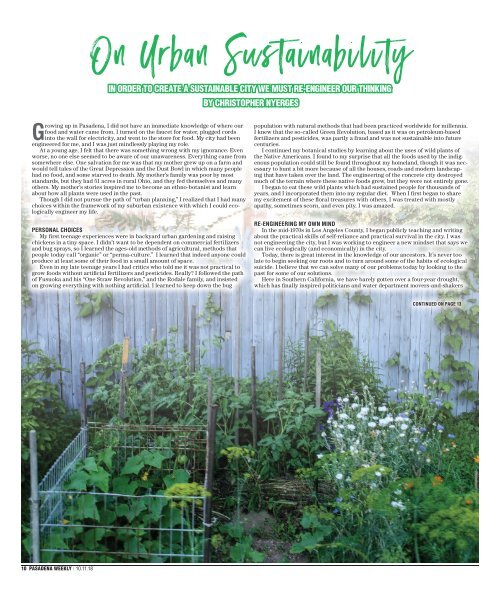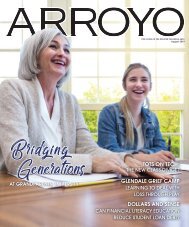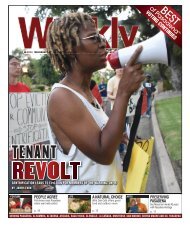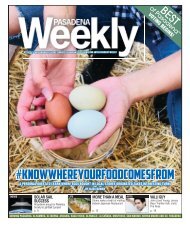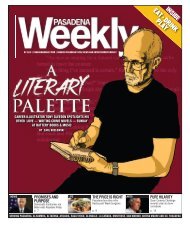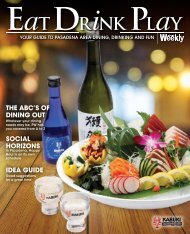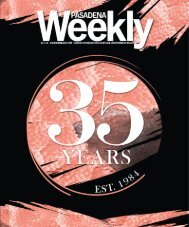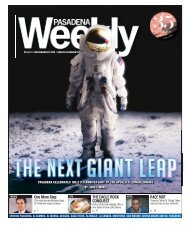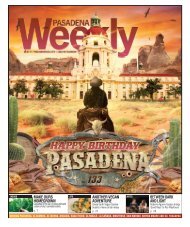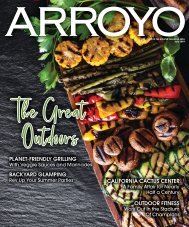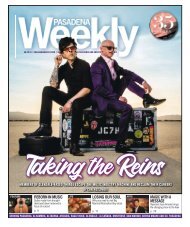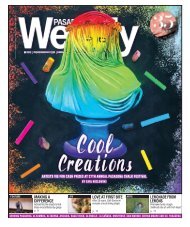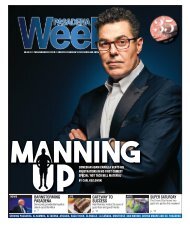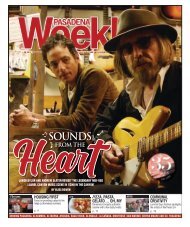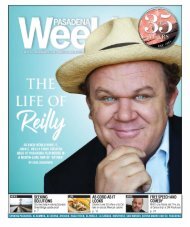10.11.18
Create successful ePaper yourself
Turn your PDF publications into a flip-book with our unique Google optimized e-Paper software.
On Urban Sustainabilityty<br />
IN ORDER TO CREATE A SUSTAINABLE CITY WE MUST RE-ENGINEER OUR THINKING<br />
BY CHRISTOPHER NYERGES<br />
Growing up in Pasadena, I did not have an immediate knowledge of where our<br />
food and water came from. I turned on the faucet for water, plugged cords<br />
into the wall for electricity, and went to the store for food. My city had been<br />
engineered for me, and I was just mindlessly playing my role.<br />
At a young age, I felt that there was something wrong with my ignorance. Even<br />
worse, no one else seemed to be aware of our unawareness. Everything came from<br />
somewhere else. One salvation for me was that my mother grew up on a farm and<br />
would tell tales of the Great Depression and the Dust Bowl in which many people<br />
had no food, and some starved to death. My mother’s family was poor by most<br />
standards, but they had 51 acres in rural Ohio, and they fed themselves and many<br />
others. My mother’s stories inspired me to become an ethno-botanist and learn<br />
about how all plants were used in the past.<br />
Though I did not pursue the path of “urban planning,” I realized that I had many<br />
choices within the framework of my suburban existence with which I could ecologically<br />
engineer my life.<br />
PERSONAL CHOICES<br />
My first teenage experiences were in backyard urban gardening and raising<br />
chickens in a tiny space. I didn’t want to be dependent on commercial fertilizers<br />
and bug sprays, so I learned the ages-old methods of agricultural, methods that<br />
people today call “organic” or “perma-culture.” I learned that indeed anyone could<br />
produce at least some of their food in a small amount of space.<br />
Even in my late teenage years I had critics who told me it was not practical to<br />
grow foods without artificial fertilizers and pesticides. Really? I followed the path<br />
of Fusuoka and his “One Straw Revolution,” and the Rodale family, and insisted<br />
on growing everything with nothing artificial. I learned to keep down the bug<br />
population with natural methods that had been practiced worldwide for millennia.<br />
I knew that the so-called Green Revolution, based as it was on petroleum-based<br />
fertilizers and pesticides, was partly a fraud and was not sustainable into future<br />
centuries.<br />
I continued my botanical studies by learning about the uses of wild plants of<br />
the Native Americans. I found to my surprise that all the foods used by the indigenous<br />
population could still be found throughout my homeland, though it was necessary<br />
to hunt a bit more because of all the houses, roads and modern landscaping<br />
that have taken over the land. The engineering of the concrete city destroyed<br />
much of the terrain where these native foods grew, but they were not entirely gone.<br />
I began to eat these wild plants which had sustained people for thousands of<br />
years, and I incorporated them into my regular diet. When I first began to share<br />
my excitement of these floral treasures with others, I was treated with mostly<br />
apathy, sometimes scorn, and even pity. I was amazed.<br />
RE-ENGINEERING MY OWN MIND<br />
In the mid-1970s in Los Angeles County, I began publicly teaching and writing<br />
about the practical skills of self-reliance and practical survival in the city. I was<br />
not engineering the city, but I was working to engineer a new mindset that says we<br />
can live ecologically (and economically) in the city.<br />
Today, there is great interest in the knowledge of our ancestors. It’s never too<br />
late to begin seeking our roots and to turn around some of the habits of ecological<br />
suicide. I believe that we can solve many of our problems today by looking to the<br />
past for some of our solutions.<br />
Here in Southern California, we have barely gotten over a four-year drought,<br />
which has finally inspired politicians and water department movers-and-shakers<br />
CONTINUED ON PAGE 13<br />
10 PASADENA WEEKLY | <strong>10.11.18</strong>


